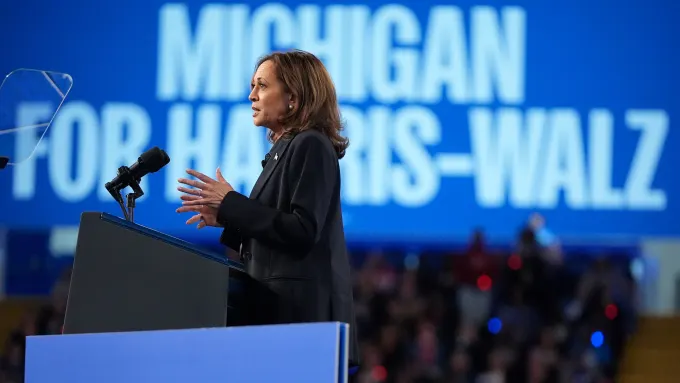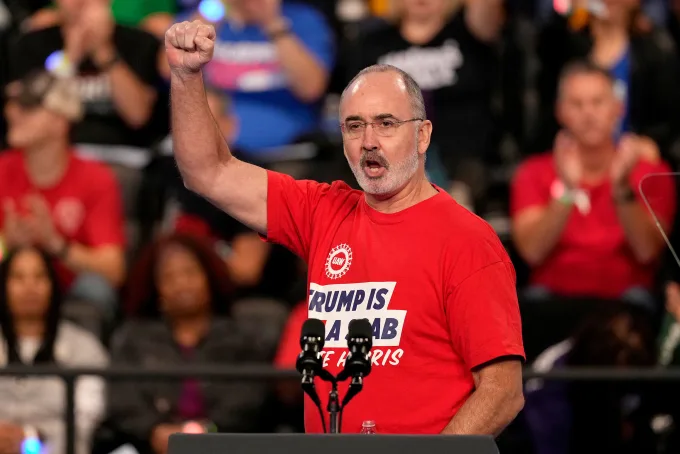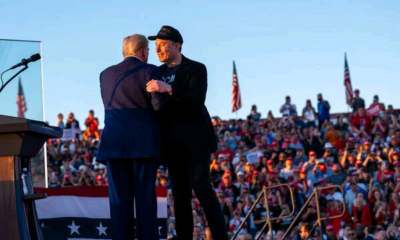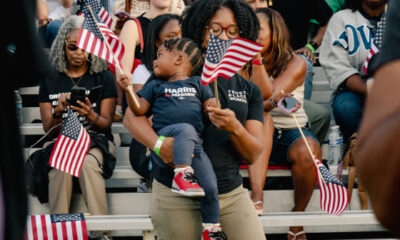NEWS
Harris tries to secure labor support amid signs of weakening..See More 👎

CNN
—
Vice President Kamala Harris’ struggle to match previous Democratic nominees’ levels of support with union voters is coming under more intense scrutiny following decisions by the Teamsters and the International Association of Fire Fighters to withhold endorsements in the presidential race.
Leaders from both unions, in public statements, cited internal disagreements within their organizations as their primary reason for staying on the sidelines.
“This decision, which we took very seriously, is the best way to preserve and strengthen our unity,” Edward Kelly, general president of the International Association of Fire Fighters, said in a statement this week explaining the choice.
The Trump campaign has celebrated these announcements, saying they are a sign that organized labor is fleeing Harris and the Democratic Party. The campaign on Thursday called the firefighters’ union’s decision to decline to endorse a 2024 candidate “another blow” to Harris, pointing to the union’s early endorsement, months ahead of the Democratic primary, of Biden.
The reality, though, is murkier – and reflects the upheaval and increasingly testy internal politics among the unions’ leaders. Harris retains a polling lead over Trump with union voters and households, but the margin, according to multiple surveys, is smaller than those enjoyed by Joe Biden four years ago and roughly even with Hillary Clinton’s levels in 2016.
Exit polls from CNN following the past two presidential elections found Biden with a 16-point lead among voters from union households. Clinton, whose loss came down to thousands of votes in labor-heavy states, won by 9 points among the same cohort.
Harris had a 6-point lead over Trump in a Fox News poll conducted in mid-September. A Quinnipiac poll from later in the month showed Harris with an 11-point advantage, similar to a Reuters/Ipsos survey that found Harris up by 12 points on Trump among voters in union households.
The vice president has been increasingly vocal in her support for labor as the election nears. Her Friday visit to Michigan comes on the heels of US dockworkers’ move to suspend their strike, which could have upset the entire US economy, as their union – which represents an estimated 45,000 workers – moved closer to securing a new contract with ports and shipping companies on the East and Gulf coasts.
“This step indicates progress toward a strong contract and represents the power of collective bargaining,” Harris said in a statement late Thursday. “As I have said, this is about fairness – and our economy works best when workers share in record profits.”
On Friday in Redford Township, just outside of Detroit, Harris ripped Trump’s labor record.
We will not be fooled,” Harris said, calling the former president and his policies “a disaster for working people, and he’s trying to gaslight people all over our country.” Harris also described him as an “existential threat to America’s labor movement.”
On Wednesday, Vance, asked by reporters whether former president Donald Trump would continue funding a $500 million federal grant approved by the Biden administration for GM’s Lansing Grand River Plant, argued that the money was being rerouted to China.
Harris also highlighted Friday $60 million in federal funding to help create an electric vehicle battery manufacturing plant in Flint, which the administration estimates will create 150 jobs.
Despite some headline-grabbing backlash, Harris has mostly kept together the coalition of labor organizations that traditionally back the Democratic nominee. United Auto Workers President Shawn Fain has emerged as one of her most prominent backers and aggressive advocates, frequently slamming Trump’s labor policies and warning that second Trump administration would be damning to the movement.
Fain, who was in Michigan with Harris called the former president and Vance “two lapdogs for the billionaire class who only serve themselves” during a fiery convention speech this summer. Trump, he added, was a “scab” – a traitor to labor unions during times of crisis.
The UAW won big wage and benefit gains after a 2023 strike that received backing from prominent Democrats, some of whom – led by Biden – joined workers on the picket lines. Biden, the self-described “most pro-union president,” last September made history by visiting a picket line in Michigan during the work stoppage.
The AFL-CIO, a powerful federation of US and international unions, endorsed Harris early on. In a statement Friday, president Liz Shuler cheered a robust jobs report and again made the case for the vice president.
“This election, America will decide between Kamala Harris, a key partner with unions in creating the worker-centered economy reflected in today’s jobs report, and Donald Trump, who would rip all of the gains we’ve made away,” Shuler said, touting the organization’s massive “voter mobilization” campaign for Harris and Walz.
Other labor leaders have moved slower, anxious that siding with either candidate in such an intense campaign would endanger their own standing.
Both the Democratic and Republican vice presidential nominees, Walz and Vance, spoke at the IAFF convention in Boston in late August. Walz’s appeal met with a kinder reception, but it was unclear if union leaders would go all-in for the Democratic ticket or sit out the race.
Vance was booed during parts of his speech, particularly after he said he and former President Donald Trump are “proud to be the most pro-worker Republican ticket in history.”
That took place about six weeks after Teamsters president Sean O’Brien took the extraordinary step of speaking at the Republican National Convention in July – before Biden dropped out. The move infuriated many labor leaders and puzzled advocates who have repeatedly warned about the setbacks in store for unions if Trump’s policies come back online.
In his remarks, O’Brien noted that Teamsters leaders had previously endorsed Republicans from Richard Nixon to Ronald Reagan and George H. W. Bush. The elder President Bush was the last GOP nominee to win their support. Every Democrat since Bill Clinton, who defeated Bush in 1992, has had the Teamsters’ official backing.
He also took multiple swings at business leaders – many of whom were in the audience at the RNC and are among some of Trump’s biggest supporters.
“We are not renters. We are not tenants. But the corporate elite treat us like squatters, and that is a crime,” O’Brien said. He did not speak at the Democratic convention and the Teamsters ultimately decided not to endorse a candidate a month later – a decision O’Brien attributed to the union’s “democratic” process and the reality that “Democrats, Republicans, and Independents proudly call our union home, and we have a duty to represent and respect every one of them.”
Larry Cohen, a former longtime president of the Communications Workers of America, downplayed the Teamsters’ decision, arguing at the time in mid-September, that it was already too late for the national organization to launch a meaningful election outreach apparatus.
“What are you actually gonna do, how in 6 weeks are you going to train people and organize them (to canvass),” Cohen told CNN. “They waited too long.”
The Teamsters PAC had previously signaled its political shift earlier in the year, when it spent $5,000 to back GOP Sen. Josh Hawley of Missouri. Those moves, though, triggered a significant pushback from Teamsters locals in battleground states.
Larry Cohen, a former longtime president of the Communications Workers of America, downplayed the Teamsters’ decision, arguing at the time in mid-September, that it was already too late for the national organization to launch a meaningful election outreach apparatus.
“What are you actually gonna do, how in 6 weeks are you going to train people and organize them (to canvass),” Cohen told CNN. “They waited too long.”
The Teamsters PAC had previously signaled its political shift earlier in the year, when it spent $5,000 to back GOP Sen. Josh Hawley of Missouri. Those moves, though, triggered a significant pushback from Teamsters locals in battleground states.
The organization’s Black and West Coast caucuses also struck out on their own, endorsing Harris’ campaign, which argued that no matter what national leadership said, she enjoyed critical support with the union.

























